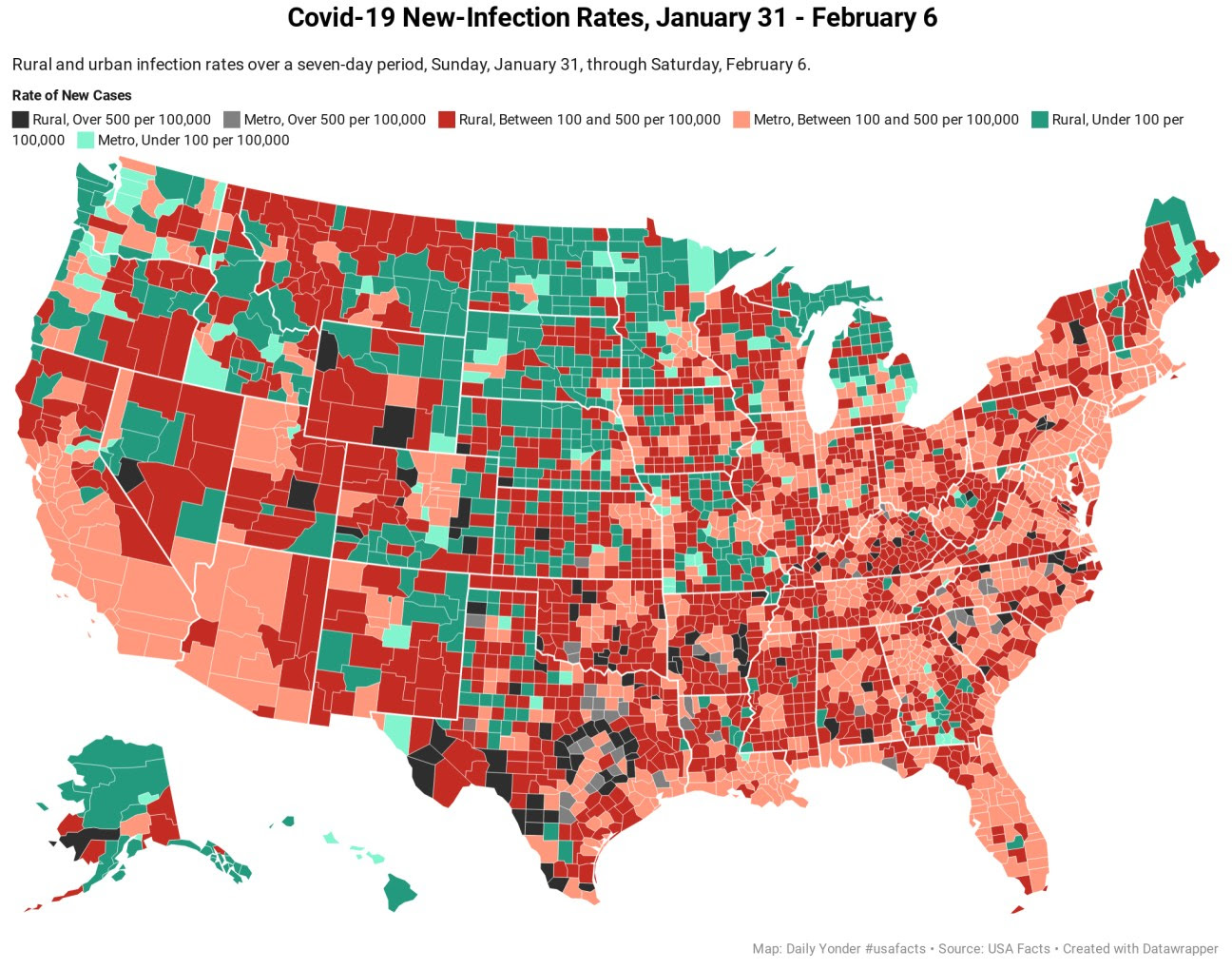- Fact Sheet: The Biden-Harris Administration Highlights Investments in Rural America, Invites Public Nominations for Rural Innovators Initiative
- Rural Victims of Intimate-Partner Violence Need More Resources and Support, Study Finds
- A Tribe in Maine Is Using Opioid Settlement Funds on a Sweat Lodge to Treat Addiction
- Fact Sheet: USDA, HHS Announce New Actions to Reduce Impact and Spread of H5N1
- Call for Experts: Forum on Aging, Disability, and Independence
- Bill to Expand Definition of 'Village' Qualifying for Water Funds Passes Alaska House
- Child Care Workers Caught in Middle of Michigan's Broken Child Care System
- Few Options Available for Substance Abuse Treatment in the Big Bend
- In Rural Texas, ERs Are Facing a Growing Mental Health Crisis
- Ways and Means Members Put Forth Solutions to Strengthen Telehealth Access and Improve Health Care for Rural Communities
- Sage Memorial Hospital in Navajo Nation Constructs New Facility to Improve Health Care
- How the State, Tribes and Federal Government Are Working to Curb SD's Syphilis Epidemic
- Rural Children Struggle to Access Hospital Services, Say Researchers
- RPHARM Program Fulfills Need for Rural Pharmacists
- A Pilot Program in Rural Vermont Hopes to Build a Blueprint for Substance Abuse Recovery
Commentary: Five Signs Rural Elders May Need A Helping Hand

By Donna Kallner
Families who have followed recommended guidelines on social distancing for nearly a year are looking forward to the time when pandemic precautions lift and they can hug their elders again. But there may be some surprises in store once you get past the front door.
Read more
New Infections Ease in Rural Counties, but the Number of Deaths Climbs Slightly

By Tim Murphy and Tim Marema
New cases dropped by 8% last week in rural counties, but the number of new Covid-related deaths climbed by about 1%.
Read more

Without a Ride, Many in Need Have No Shot at Covid-19 Vaccine

By Jenni Bergal, Stateline
Experts identified cold storage capacity, facilities and personnel, and – above all – transportation as the main roadblocks to vaccinating parts of rural populations.
Read more
Changes in CDC Gonorrhea Treatment Recommendations
The Pennsylvania Department of Health released a PA Health Alert Network (PAHAN-549-01-29-ADV) on Changes in the CDC Gonorrhea Treatment Recommendations. With the ongoing threat of antibiotic resistance in gonorrhea, the Centers for Disease Control and Prevention (CDC) released a change to the recommended treatment for gonorrhea. It is suggested that providers adopt these new CDC recommendations as cases are at and a historic high. Young adults age 15-30 represent a significant disproportionate number of cases, representing 63% of all reported cases in 2020. Providers are encouraged to maintain a high index of suspicion for the emergence of resistant gonorrhea by immediately reporting any suspected treatment failures to 1-877-PA-HEALTH. Click here to read the PAHAN.
Routine Dental Care May Reduce Stroke Risk
The importance of good oral health and its relationship to physical health has again been validated. According to a new study published in the American Heart Journal, periodontal disease appears to be associated with atrial fibrillation, and an irregular heart rate may be the mediator between the serious gum infection and stroke.
Cybersecurity A Rising Concern
As a result of increased technology use and data sharing, along with the vaccine rollout effort and continuation of remote work, cybersecurity will become more of a focal point for healthcare companies in 2021, experts predict. The rise of telehealth has also led to more cyberattacks. Telehealth providers reported a huge increase in targeted attacks last year as adoption skyrocketed. Investment in cybersecurity also makes sense as two new Department of Health and Human Services regulations meant to nudge the industry toward interoperability are taking effect in April. They will result in health data being shared more broadly, raising significant privacy and security concerns. Additionally, Trump administration regulatory rollbacks finalized in late 2020 include provisions allowing providers, including hospitals, to share cybersecurity software with one another.
Employers Respond to Changing Needs of Workforce in Pandemic
The COVID-19 pandemic has made for a continually changing workforce environment. Companies are adapting their practices and policies to support their staff by offering flexible paid and unpaid leave policies, reimbursing remote-work expenses and giving access to tools for managing stress and improving mental health. Employers are also providing on-going support for employees to help them understand and maximize their benefit package. Click here for more information and recent survey results from the International Foundation of Employee Benefit Plans (IFEBP).
Study Finds Young Adults Are Major Coronavirus Spreaders
A new study finds that adults aged 20-49 were responsible for most virus transmission last year, even after schools reopened in the fall. The study, published in Science, challenges the notion that non-vulnerable people can go about their normal lives, while vulnerable people self-isolate. Three-quarters of new infections originated from adults 20–49 until mid-August of last year, with adults 35–49 contributing the most to spread. In October, after a large portion of U.S. students returned to school, this age group was still responsible for about 72 percent of new infections. The study estimates that school reopening’s increased total infections by about 26 percent as of October, and deaths by about six percent–because children and teenagers spread the virus to adults, who are “more transmission efficient.”
Long-Term Impacts of COVID-19 Leaves Questions
Millions of COVID-19 survivors worldwide–even those who had mild illness–are reporting long-term symptoms months later, including brain fog, persistent exhaustion and lung, heart or kidney damage. For too long, these long haulers, as they call themselves, have not been taken seriously enough by providers and researchers according to some doctors, adding that there’s an urgent need for dedicated research in order to treat patients with lingering symptoms. Many providers and healthcare systems initially dismissed the symptoms as related to something else, but growing evidence points to SARS-CoV-2 as the culprit in many cases. More research is needed to determine the full long-term effects.
Another Lawsuit Filed to Strike Down 340B Dispute Resolution Rule
Pharmaceutical Research and Manufacturers of America (PhRMA) sued in federal district court in Maryland to strike down the federal final rule that established the new 340B program administrative dispute resolution (ADR) process. It also wants the court to declare federal 340B program guidelines governing drug manufacturer audits of 340B covered entities illegal.
